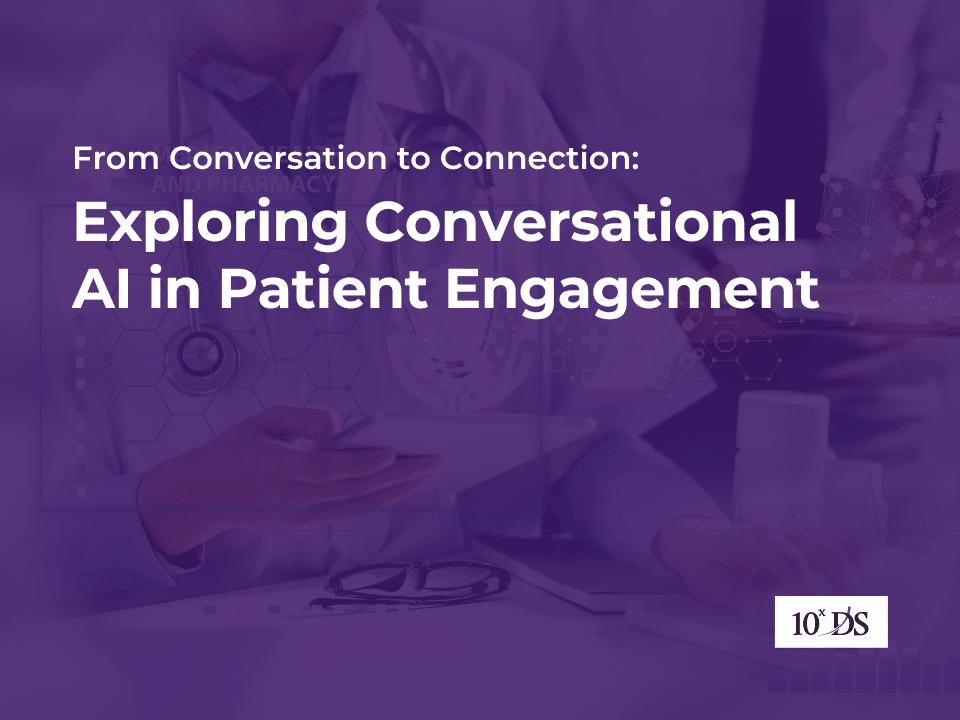
From Conversation to Connection: Exploring Conversational AI in Patient Engagement
Chatbots are like friendly aides that handle routine tasks with predefined answers. They follow a script and respond based on specific keywords. For instance, if you ask a chatbot to “schedule an appointment,” it identifies the keyword “schedule” and assists accordingly. Conversational AI, on the other hand, goes beyond basic chatbots. It uses natural language processing (NLP) and machine learning algorithms to engage in contextually rich conversations. Conversational AI understands human language nuances, resulting in more interactive and natural interactions. It’s like having a skilled partner capable of detailed discussions and personalized assistance. Surveys indicate that customers generally prefer speaking with humans for support needs. Human interactions provide empathy, understanding, and emotional connection. Conversational AI tends to cater to that specific human need by providing natural interactions. As these technologies improve, users appreciate their convenience, speed, and availability.
Conversational AI is poised to revolutionize patient engagement in the healthcare sector. Let’s delve into how it can make a significant impact:
Accessibility and Empowerment
Conversational AI plays a pivotal role in enhancing healthcare accessibility by enabling patients to receive instant and personalized responses to their queries. This seamless interaction not only provides relevant health information at their fingertips but also empowers individuals to take charge of their well-being. With this ease of access, patients can effortlessly seek information, schedule appointments, and manage their health more proactively, fostering a more engaged and informed approach to healthcare.
Enhanced Communication
Conversational AI serves as a crucial intermediary in connecting healthcare providers with patients, acting as a pivotal touchpoint in the healthcare journey. Beyond facilitating seamless communication, it empowers patients by offering effortless access to various services, such as requesting prescription refills, accessing test results, and obtaining details about medications. By streamlining these interactions, conversational AI significantly enhances the overall patient experience, fostering smoother communication channels and improving accessibility to essential healthcare resources.
Efficiency and Accuracy
In hospitals, AI-powered bots play a crucial role in automating routine tasks, allowing healthcare professionals to dedicate their time and expertise to more complex responsibilities. For instance, conversational AI capabilities streamline processes such as appointment scheduling, significantly reducing manual input and minimizing errors. Moreover, these bots can prompt users to update their patient data regularly, ensuring the accuracy and completeness of the information. The outcome is a healthcare system marked by enhanced efficiency, precision, and organization, ultimately benefiting both healthcare providers and patients alike.
Future Outlook
As conversational AI continues to evolve, its role in healthcare is set to expand, tackling challenges and adapting to emerging needs. Anticipate further advancements in personalized patient interactions, where AI-driven systems will tailor responses and recommendations based on individual health profiles and preferences. Additionally, the development of virtual health assistants is expected to become more sophisticated, offering comprehensive support and guidance to patients throughout their healthcare journey. Moreover, seamless communication channels facilitated by AI technology will enhance collaboration between healthcare providers and patients, ultimately contributing to improved health outcomes and patient satisfaction.
Conversational AI, when integrated with wearable health monitoring devices, plays a pivotal role in enhancing patient care and promoting proactive health management. Let’s explore some key use cases:
Real-Time Health Tracking
- Wearable devices equipped with AI continuously monitor vital signs such as blood pressure, glucose levels, and heart rate.
- Conversational AI instantly informs individuals about any abnormalities detected. For instance, if blood pressure spikes, the AI can prompt the user to seek medical attention promptly.
Fitness and Activity Tracking
- AI analyzes data on movement and physical activity from wearables.
- It provides valuable insights into exercise routines, calorie expenditure, and fitness goals.
- Users receive personalized recommendations, encouraging them to maintain a healthy and active lifestyle.
Sleep Tracking and Improvement
- AI algorithms assess sleep patterns and quality using wearable data.
- Recommendations are offered to improve sleep habits.
- Issues like sleep apnea can be detected early, contributing to overall well-being.
Stress Management and Mental Health
- Physiological indicators are used to monitor stress levels.
- Wearables with AI suggest relaxation techniques and mindfulness exercises.
- Users learn to manage stress effectively, positively impacting mental health.
Chronic Condition Management
- For individuals with conditions like diabetes, AI-powered wearables are invaluable.
- They track blood sugar levels, provide medication reminders, and offer dietary recommendations.
- Adherence to treatment plans improves, leading to better health outcomes.
Post-Operative Care and Remote Monitoring
- Wearables with AI continuously track vital signs like heart rate, rhythm, blood pressure, and oxygen saturation.
- This real-time monitoring is especially helpful for patients recovering from surgery or undergoing remote care.
Fall Detection for Seniors
- AI algorithms can detect falls based on movement patterns.
- Alerts are sent to caregivers or emergency services, ensuring timely assistance for seniors and those at risk.
Integration with Electronic Health Records (EHRs)
- AI-driven wearables seamlessly integrate with EHRs, providing a comprehensive view of a patient’s medical history.
- This holistic perspective enhances healthcare decision-making.
In conclusion, conversational AI stands as a transformative force in patient engagement within the healthcare landscape. Through its innovative capabilities, such as personalized interactions, virtual health assistants, and streamlined communication channels, conversational AI empowers patients to take a more proactive role in managing their health. By providing immediate access to information, assistance with appointments, and personalized recommendations, conversational AI enhances the overall patient experience while promoting better health outcomes. As technology continues to evolve, the potential for conversational AI to revolutionize patient engagement in healthcare remains vast, promising a future where individuals are more informed, involved, and empowered in their healthcare decisions. That is why Accenture predicts that AI in healthcare can save the US healthcare economy a whopping $150 billion annually by 2026.
Talk with our experts to learn more.


